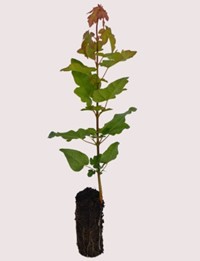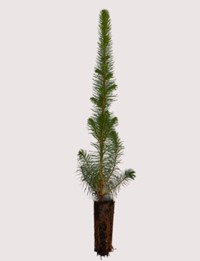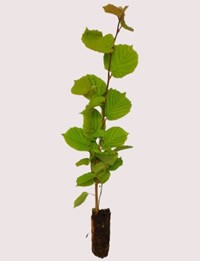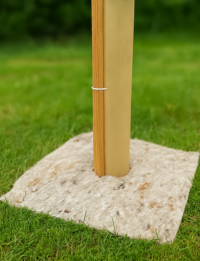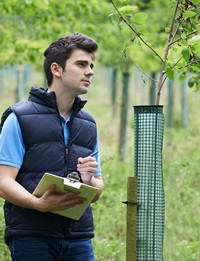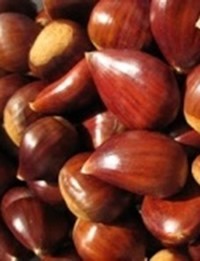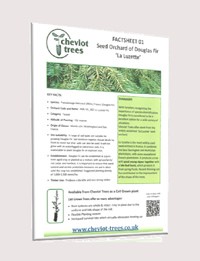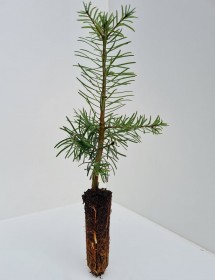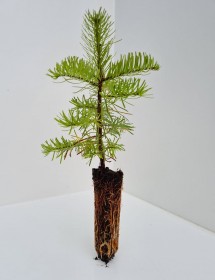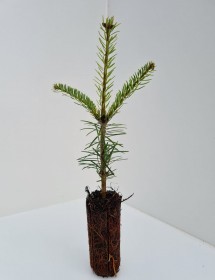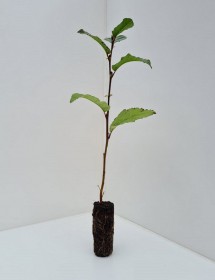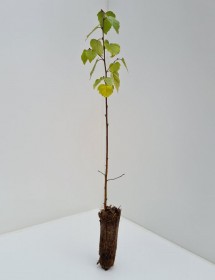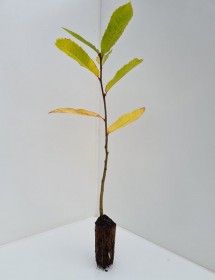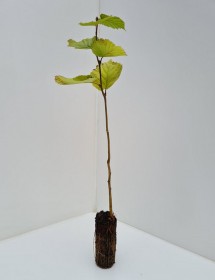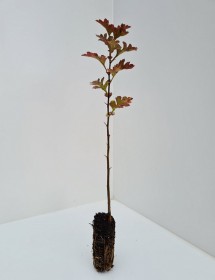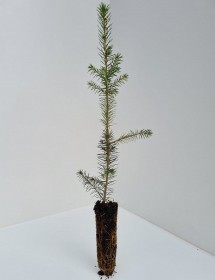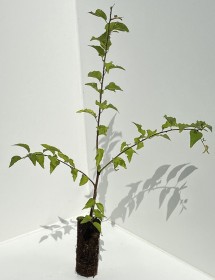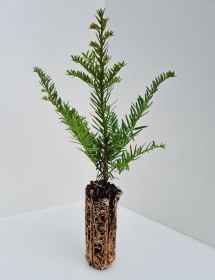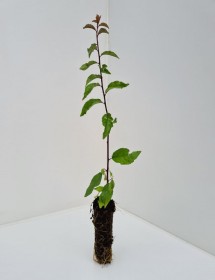
Cell Grown Plants
Every year our nursery in the Scottish Borders produces millions of cell grown broadleaves, conifers, shrubs, hedging plants and a range of other species for environmental planting. Our species range is extensive and we have species to suit all planting objectives.
Cell grown plants can be planted almost all year round and offer excellent survivability as they are supplied with a complete and intact fibrous root system.
-
Abies alba - European Silver Fir
£1.98from £0.88Abies alba - Silver fir is a long-living conifer upright-growing evergreen conifer with dark green needles that are silver underneath. The yellow-green cones which appear in late spring are cylindrical in shape and ripen to brown.
The strong, lightweight timber is mainly used for construction, furniture, plywood and pulpwood. Young trees are also popular as Christmas trees. Ecologically, the tree is important for maintaining high biodiversity in forested areas. The tree’s deep taproots offering stability, alongside its easily biodegradable needle litter, are key in the establishment and management of silvicultural systems.
Silver fir is shade-tolerant and able to act as a “seedling bank” under the canopy of older dominant trees for decades.
-
Acer campestre - Field Maple
£1.52from £0.67Acer campestre - Field maple is a versatile and resilient fast growing small to medium sized tree that is also suitable for hedgerow planting.
It is a colourful species; the attractive five lobed leaves are flushed red in Spring, turning green and then yellow / gold in the Autumn. Deciduous. Native to the UK
Our cell grown Field Maple plants are often used for hedge planting either on their own or mixed with other species such as Hawthorn, Blackthorn, Hazel etc. Usually at a planting density of 6 plants per metre.
-
Abies fraserii - Fraser Fir
£1.98from £0.88Abies fraserii - Fraser Fir is a fast growing, large evergreen with dark green needles that have a silver grey underside.
Originally from the USA, this species is most frequently planted in the UK for Christmas tree crops as it has a dense, busy habit when young. Fraser Fir has a narrower and more compact shape than Nordmann Fir so is often suited to smaller rooms in houses if it is grown to then be supplied as a cut Christmas tree.
We grow several other species of cell grown conifers which are all suited for Christmas tree production.
-
Acer platanoides - Norway Maple
£1.98from £0.88Acer platanoides - Norway Maple is a beautiful fast growing tree of large stature which is best suited to parkland or settings where its superb autumn colour can be fully appreciated.
Deciduous. Native to Central / Eastern but widely adapted to the UK. Norway Maple has a typical maple shaped leave which turns bright yellow in the autumn.
-
Abies grandis - Grand Fir
£1.82from £0.81Abies grandis - Grand Fir is a very large and stately evergreen conifer that has a very fast rate of growth.
It is one of several north west American species discovered by the well known plant hunter, David Douglas who sent seeds back to the UK in 1831.
Needles are dark green and grooved on top with two white bands. A very shade tolerant species that is ideally suited for underplanting in continuous cover forestry but it is equally as impressive when grown as a specimen tree.
-
Acer pseudoplatanus - Sycamore
£1.82from £0.81Acer pseudoplatanus - Sycamore. The marmite of forestry that needs little or no introduction. Undemanding, tolerant, and productive.
Deciduous. A native to central and southern Europe but is considered by some to be an honorary native to the UK. Simple, large green leaves and interesting grey, flaky bark.
We produce this species from multiple seed sources including an Improved seed source. The breeding work to produce the Improved seed was carried out by the Future Trees Trust.
-
Alnus cordata - Italian Alder
£1.70from £0.74Alnus cordata - Italian Alder is a fast growing, medium sized tree which grows in most soils except heavy clay. Tough and hardy with nitrogen fixing qualities. Often used on reclamation or hostile sites.
Bright green glistening foliage preceded by yellow catkins that appear in late winter. Ideal for forming a windbreak or for companion planting with species such as Douglas Fir and Sitka Spruce.
-
Abies nobilis - Noble Fir
£1.82from £0.81Abies nobilis - Noble Fir is a well regarded evergreen conifer that has a very high tolerance of exposure and it is often planted in the uplands.
It is one of several north west American species discovered by the well known plant hunter, David Douglas who sent seeds back to the UK in 1831.
Needles are blue grey in colour and are upcurved. A popular species for Christmas tree production due to its steady growth, attractive shape, good needle retention qualities and desirable foliage colour.
We grow several other species of cell grown conifers which are all suited for Christmas tree production.
-
Abies nordmanniana - Nordman Fir
£1.98from £0.88Abies nordmanniana - Nordman Fir is the best selling species for Christmas tree production.
It has luscious soft dark green needles, a symmetrical shape, and excellent needle retention qualities.
We grow several other species of cell grown conifers which are all suited for Christmas tree production.
-
Alnus glutinosa - Common Alder
£1.52from £0.67Alnus glutinosa - Common Alder, is a medium to large sized tree liking a natural habit of damp ground near rivers and lochs, but it is equally found in mixed woodlands on drier ground.
-
Cedrus atlantica - Atlas Cedar
£2.13from £1.03Cedrus atlantica - Atlas Cedar is a large evergreen conifer with silvery blue needles. The branches are horizontal and stiff.
Native to Morocco and Algeria in the Atlas Mountains where it is often grown as a pure stand. It is the only African tree that thrives in the UK, and most of the plants that we produce are used by our customers in the Southern and Eastern areas of the UK, as it is capable of withstanding periods of drought once established.
It produces strong and durable timber that is renowned for its strong and persistent fragrance.
Learn more about Atlas Cedar by reading our factsheet.
-
Alnus rubra - Red Alder
£1.70from £0.74Alnus rubra - Red Alder shares many of the features of our native Common Alder and is ideal for forming a windbreak or for companion planting with species such as Douglas Fir and Sitka Spruce.
-
Betula pendula - Silver Birch
£1.52from £0.67Betula pendula - Silver Birch is one of the UK’s most well-known and hardiest native trees which offer so much interest due to its graceful habit and papery/peeling white bark with brown contrast.
Deciduous. A true pioneer species which rapidly colonises open areas and supports over 300 species of insect. Silver Birch is one of the most productive broadleaves species in Scandinavian countries and a multifunctional species for the UK. Excellent planted as a mixture with other species, superb as a windbreak and provides excellent quality firewood!
We produce this species from multiple seed sources including an Improved seed source. The breeding work to produce the Improved seed was carried out by the Future Trees Trust.
-
Cryptomeria japonica - Japanese Red Cedar
£1.82from £0.81Cryptomeria japonica - Japanese Red Cedar is a large evergreen tree with green, dense foliage that turns bronze in Winter.
Introduced into Britain in 1879, the Japanese Red Cedar has demonstrated its ability to produce a yield that is comparable to other commonly used conifers in the UK such as Douglas Fir & Western Red Cedar. It’s expansion into UK is likely to be in areas with a warm, moist maritime climate such as W. Scotland, Wales and SW England.
There is limited experience of processing the timber in the UK but in its native range it is highly regarded as a major construction timber and is also often used in exterior, ground contact applications as the timber has good natural durability.
Learn more on this Fact Sheet.
-
Betula pubescens - Downy Birch
£1.52from £0.67Betula pubescens - Downy Birch is probably one of the toughest native species. Its range extends into the artic, more northerly than any other broadleaved species!
Deciduous. It is similar in appearance to Silver Birch but has a more upright habit and a darker bark.
-
Cuppressocyparis leylandii - Leylandii
£3.64from £1.73Leylandii is a large evergreen conifer that is most commonly utilised for hedging or screening purposes.
Tough, Fast growing and tolerant of most conditions.
The foliage is dense, dark green in colour and flat in shape. We also produce Golden Leylandii.
If you are planting for hedging/screening you may also wish to consider Western Red Cedar. This species is equally as fast growing but has a tighter shape and a richer shade of green.
-
Carpinus betulus - Hornbeam
£1.82from £0.81Carpinus betulus - Hornbeam is an excellent versatile species which can either be used for forestry purposes or for hedging. If grown for hedging the leaves will stay on throughout most of the winter.
-
Cupressocyparis leylandii Castlewellan Gold -...
£3.64from £1.73Cupressocypairs leylandii Castlewellan Gold - Golden leylandii is a large evergreen conifer that is most commonly utilised for hedging or screening purposes.
Tough, Fast growing and tolerant of most conditions.
The new growth is strikingly golden yellow in colour. We also produce Green Leylandii.
If you are planting for hedging/screening you may also wish to consider Western Red Cedar. This species is equally as fast growing but has a tighter shape and a richer shade of green.
-
Castanea sativa - Sweet Chestnut
£1.98from £0.88Castanea sativa - Sweet Chestnut is a good example of a multi functional species. Excellent as a parkland tree, great for coppicing, and the chestnuts provide a tasty treat for red squirrels!
Native to Southern Europe but thought to be introduced by the Romans, Sweet Chestnut is found throughout the UK and is commonly associated with Southern England. Deciduous with long, narrow glossy leaves.
-
Juniperus communis - Common Juniper
£3.34from £1.47Juniperus communis - Juniper is a small evergreen conifer that is native to the UK.
Small green needles with a prickly point. Juniper is dioecious so the male and female flowers grown on separate plants. Once pollinated by wind the female flowers develop into fleshy purple berries.
The berries are popular for flavouring gin but they are equally favoured birds who eat the berries. Juniper is also an important habitat for small mammals and nesting birds due the dense cover that it provides.
-
Corylus avellana - Hazel
£1.82from £0.81Corylus avellana - Hazel is a small shrubby tree which is often found in mixed native woodlands and hedgerows.
It is well known for its long yellow catkins which appear in the Spring and then produces hazelnuts in the summer. Native to the UK.
Our cell grown Hazel plants are often used for hedge planting either on their own or mixed with other species such as Hawthorn, Blackthorn, Dog Rose etc. at a planting density of 6 plants per metre.
-
Larix decidua - European Larch
£1.46from £0.59Larix decidua - European larch is one of the few deciduous conifers.
It has a lot to offer. It is tough and robust, provides strong durable timber and offers fantastic landscape value in the Autumn when its foliage changes to a golden yellow colour.
Its native range is the mountainous regions in Central and Eastern Europe where it grows well at high elevations. It has grown successfully in the UK since it was introduced in the early 17th century.
The timber is noted for its hardness, strength, and natural durability so it is often used for exterior purposes. The seeds are a tasty treat for red squirrels!
We also produce Hybrid Larch.
-
Crataegus monogyna - Hawthorn
£1.60from £0.70Crataegus monogyna - Hawthorn is the backbone of most British hedgerows and is one of the first species to produce new leaves in the Spring. If left untrimmed it will grow into a small tree with a very dense crown.
A very showy native species with fragrant, creamy white flowers in the Spring followed by green haws (berries) turning red in autumn.
Spiny, dense deciduous foliage which provides an excellent habitat for birds and insects.
Our cell grown Hawthorn plants are often used for hedge planting either on their own or mixed with other species such as Crab Apple, Blackthorn, Dog Rose etc. at a planting density of 6 plants per metre.
-
Metasequoia glyptostroboides - Dawn Redwood
£3.64from £1.73Metasequoia glyptostroboides - Dawn Redwood is a large deciduous conifer which needs plenty of space to reach its full potential.
This ancient species was considered to be extinct until a small group were discovered in China in 1944. Whilst it has been widely planted throughout the world since then it is still carries the endangered status by the IUCN.
It has bright green needles which are light and feathery – quite similar in appearance to Coastal Redwood. The foliage turns to fiery shades of orange and brown in the Autumn which provides a spectacular show of colour.
A great choice for avenue and parkland planting.
-
Fagus sylvatica - Green Beech
£1.82from £0.81Fagus sylvatica - Green Beech is one of the most widely planted broadleaved trees in Europe. A long lived species that is commonly used in the UK as a component in a mixed woodland, for hedging or for parkland planting due its very broad crown.
Smooth, silver grey bark. Dark green leaves turning yellow then copperin autumn. The leaves are retained on the plant during the winter if the plant is maintained as a hedge. If you are comparing Beech or Hornbeam for hedging and you have damp soil and or you are in a cold exposed area then we would suggest using Hornbeam.
-
Juglans regia - English Walnut
£3.64from £1.73Juglans regia - English Walnut is a large fast growing species. A well known tree which was first introduced by the Romans who valued its nuts. Native from South-East Europe to South-west China.
Widely planted throughout the UK an it makes a fantastic and well shaped specimen for planting in parkland area, avenues, riverbanks and as a hedgerow tree.
The timber is equally as valuable as the nuts and can be used for furniture manufacture and veneer.
The foliage is shiny, pinnate with individual oval pointed leaflets which turn yellow in autumn.
Flowers appear in early Summer in the form of long catkins and in the Autumn the flowers turn to brownish green fruits that are around the size of a plum. The brown nut is held inside the husk.
We also produce Juglans nigra - Black Walnut.
-
Picea abies - Norway Spruce
£1.46from £0.59Picea abies - Norway Spruce is one of the most important and widely distributed tree species in Europe.
With the exception of coastal areas it has no climatic limitations throughout the UK so it as been widely planted for timber production plus it has a high ecological value.
Coniferous. Evergreen with sharp, pointed needles that have a rich sweet smell.
The traditional species for Christmas tree production due to its busy habit and attractive scent. It does not have the cut tree needle retention qualities of other Christmas trees species such as Nordmann Fir, however the fast rate of growth and relatively low cost of production still makes it a popular choice – especially for larger display trees.
-
Picea omorika - Serbian Spruce
£1.52from £0.67Picea omorika - Serbian spruce as the name suggests originates from Serbia and is a large evergreen conifer with an alpine appearance.
It is similar to Norway Spruce although it has shorter branches with a downward curve and the crown is much more narrow and pointed.
Evergreen with sharp, pointed needles that have a rich sweet smell. The juvenile cones are purple tinged before ripening to a brown colour.
A very attractive species with a slender columnar habit that is ideal for parkland planting.
-
Malus sylvestris - Crab Apple
£1.62from £0.70Malus sylvestris - Crab Apple is a good multi purpose native species. Good as part of a mixed hedge or woodland.
Deciduous. Glossy, oval leaves which has rounded teeth and sweetly scented blossom in the Spring which is pollinated by insects and bees. The pinky white blossom them develops into small, yellow-green apple like fruits.
Crab apple is an important food source for wildlife. The leaves are enjoyed by caterpillars of many moths, the flowers are an important early pollen source and the long lasting fruits are eaten by birds during the winter months.
-
Picea pungens glauca - Blue Spruce
£1.98from £0.88We grow Picea pungens glauca - Blue spruce primarily for the purpose of Christmas tree production.
It is easy to see why this species is a popular choice. It has the traditional pyramid shape with stiff horizontal branches and a dense habit.
Slower growing then Norway spruce but worth waiting for!
The classic shape combined with attractive blue tinted needles makes it stand out when compared against other species – a premium choice.
We grow several other species of cell grown conifers which are all suited for Christmas tree production.
-
Platanus acerfolia - London Plane
£3.47from £1.65Platanus acerfolia - London Plane is extensively planted in Southern England as a street trees due to its tolerance for air pollution but it is considered to also be a useful forest tree for the UK as a result of climate warming.
A vigorous deciduous tree with distinctive flaky brown and grey bark.
London Plane has large bright green lobed leaves with interesting clusters of round fruits.
The timber is strong and widely valued for joinery / cabinetry.
-
Picea sitchensis - Sitka Spruce
£1.46from £0.59Picea sitchensis - Sitka Spruce is economically important and the backbone of the UK forestry industry. This single species accounts for half of the UK’s commercial plantations.
Introduced to the UK in around 1850 although its use expanded enormously in the 20th century to help increase the UK’s perilously low percentage of forest cover.
Coniferous. Evergreen with sharp, flattened needles.
The dense foliage of Sitka Spruce provides good shelter for large mammals.
We grow our Sitka Spruce from Improved seed source to maximise the future timber yield. The sawn timber is versatile and utilised for many purposes including construction and packaging.
-
Populus Hybrid - Hybrid Poplar
£2.30from £1.03Populus Hybrid - Hybrid Poplar is a very versatile and vigorous clone which has been produced from natural plant breeding.
This clone will grow into a large tree with a stout stem. Ideal for wood fuel production, creating windbreaks and screening.
Deciduous with glossy green heart shaped leaves which turn brilliant yellow in autumn.
-
Pinus peuce - Macedonian Pine
£1.98from £0.88Pinus peuce - Macedonian Pine is a handsome, upright coniferous tree which can grow to 30m tall. It has a pyramidal growing habit, with glossy young green shoots, showing deep blue-green needle-like leaves up to 10cm long. In the autumn, cylindrical green cones with white resin, each up to 15cm long, are borne on short stalks which ripen to brown later in the year.
The Macedonian Pine is very hardy, tolerating the high mountain alpine tree lines and thrives on free draining soils.
-
Pinus pinaster - Maritime Pine
£1.52from £0.67Pinus pinaster (Maritime Pine) is a fast growing, medium sized conifer native to the Mediterranean. This species is considered as an alternative to some more widely used trees if climate change proceeds as predicted. The best results can be achieved by planting in Southern Britain.
It grows best in lighter, acidic or neutral soils near the sea, but is can also grow on saline soils and very shallow soils.
Maritime Pine has stout evergreen needles in pairs, with attractive bright reddish-brown bark. -
Populus nigra - Black Poplar
£2.40from £1.35Populus nigra - Black Poplar is probably the rarest tree species in our range! Black Poplar is native to the UK and was once a common sight throughout the country but there are very few in existence.
Deciduous. Shiny green leaves which are heart shaped. Black Poplar is dioecious meaning male and female flowers are found on separate trees. The flowers are in the form of catkins which are red on male trees and yellow-green on females.
-
Pinus sylvestris - Scots Pine
£1.46from £0.59Pinus sylvestris - Scots Pine is one of only three conifers native to the UK and our only native Pine. It is the worlds 2nd most widespread conifer after Juniper.
An important species for the UK for economic and ecological reasons.
A large evergreen conifer Scots Pine has long blue green needles that grow in pairs. Male and female flowers grow on the same tree and once the female flowers have been pollinated by wind they turn green and develop into cones. The mature cones are grey-brown in colour.
The redwood timber of Scots Pine is relatively lightweight yet strong and can be easily treated with preservatives to prolong its service life for exterior uses.
-
Populus tremula - UK Aspen
£1.82from £0.81Populus tremula - Aspen is a beautiful large fast growing tree which is native to the UK and the cooler regions of the northern hemisphere. It is characterised by its trembling and shimmering foliage.
Deciduous. Aspen is a very useful tree species which helps to stabilise soils, mitigate pollution plus it has a high ecological value for numerous insects and fungi. Aspen is a valuable and well regarded timber crop in Scandinavia for firewood, plywood manufacture and paper production.
We grow aspen from two different sources; a UK seed source and also a specific Scottish clonal collection. The latter option is more expensive than the generic UK source due to significantly higher propagation costs but it enables us to offer a reliable supply of plants from a Scottish origin.
-
Pseudotsuga menziesii - Douglas Fir
£1.60from £0.70Pseudotsuga menziesii - Douglas Fir is an evergreen conifer that was named after David Douglas who sent the first seed back from North America to Britain in 1827.
It has soft green needles with two grey bands underneath. Oval shaped cones hang and the bark is an attractive reddish brown colour.
One of the most important timber species in the world and widely planted in the UK, Douglas Fir is fast growing and the timber is strong and durable with few knots.
-
Taxodium distichum - Swamp Cypress
£3.64from £1.73Originally from South Eastern America, Taxodium distichum - Swamp cypress is a narrow, pyramidal conifer with soft green needles that turn attractive shades of orange and red in the Autumn.
On mature trees the bark peels which adds considerable winter interest.
Often confused with either Coast Redwood or Dawn redwood but Swamp Cypress needs a good supply of moisture.
-
Prunus avium - Wild Cherry
£1.93from £0.93Prunus avium - Wild Cherry is an attractive species not only aesthetically but also in commercial terms. The timber from Wild Cherry is highly valued in Europe with the top quality pieces destined for the veneer industry.
A large deciduous tree that requires plenty of space. Expect all year round interest with Wild Cherry. It has deep reddish brown shiny bark and the new bright green toothed leaves appear simultaneously with the long lasting clusters of white flowers. Once pollinated the flowers develop into globular shiny, deep red cherries. The leaves turn gold through to red in the Autumn to provide a spectacular show.
We produce this species from multiple seed sources including an Improved seed source. The breeding work to produce the Improved seed was carried out by the Future Trees Trust.
-
Prunus cerasifera - Cherry Plum
£1.70from £0.74Prunus cerasifera - Cherry Plum is a fast growing, dense hedging plant which is an excellent choice for providing shelter.
Masses of pure white flowers smother the branches in early March before the leaves appear and these are followed in autumn by tasty red or yellow, spherical cherry-plums. You can make jam, wines or even liqueurs from the fruits and it forms a very dense hedge of thorny twigs making it an extremely effective barrier.
The Cherry Plum is an excellent attractant and nectar source for bees and other beneficial insects.
Ultimate height 25 feet (7.5 metres). Can be trimmed to any height above 4 feet (120 cm). Average annual growth rate 1 - 2 feet (45 - 60 cm).
-
Taxus baccata - Yew
£1.93from £1.03Native to the UK, Taxus baccata - Yew is a dense evergreen conifer with small green needles.
Used for hundreds of years in the UK to create hedging, the bright green spring growth matures to a dark green for a classical look. It can be easily shaped and makes an excellent screen for privacy.
It is often perceived to be a slow growing species but it is actually quite fast growing in its juvenile stage.
The normal spacing for hedge planting is around 3 plants per linear metre.
-
Thuja plicata - Western Red Cedar
£1.52from £0.67Thuja plicata - Western Red Cedar is a very useful species and a popular choice with our customers. It is a tall, multi-functional evergreen conifer.
It has flat sprays of sweetly scented green foliage with brown, oval shaped cones.
In the UK Western Red Cedar is planted for timber production and also for hedging.
The highly durable redwood timber is well regarded as it contains a natural preservative with helps to resist fungal attack.
Western Red Cedar is an excellent hedging species as it is evergreen, dense and is easier to manage than other conifer species such as leyandii. If planting for hedging the normal planting density is 3 plants per metre.
-
Prunus padus - Bird Cherry
£1.92from £0.93Prunus padus - Bird Cherry is native to the UK and we tend to associate it with the northern part of the UK.
Tough and resilient with lots of value for wildlife and it provides an excellent show in the Spring in the Autumn.
Deciduous. Green leaves more oval like in shape than Wild Cherry turning yellow and orange in Autumn.
Almond scented stalks of blossom in the Spring which provide a good early nectar and pollen source for bees. Once pollinated, the flowers develop into reddish brown cherries with a bitter taste which are stripped from the trees by birds.
-
Prunus spinosa - Blackthorn
£1.52from £0.67Prunus spinosa - Blackthorn is widely used throughout the UK for good reasons; robust, useful and tolerant. Commonly used to form impenetrable hedging or as a stand alone large shrub/thicket.
The snow white flowers on Blackthorn mark the start of early Spring and appear before the leaves which are green and narrow in shape.
Once pollinated by insects the flowers develop into small dark fruits.
Blackthorn has long spikes and is densely branched - an ideal location for bird nesting.
Our cell grown Blackthorn plants are often used for hedge planting either on their own or mixed with other species such as Crab Apple, Hawthorn, Dog rose etc. at a planting density of 6 plants per metre.
-
Pyrus communis - Wild Pear
£1.62from £0.70Pyrus communis (Wild Pear) is a long lived small to medium sized tree with a columnar habit. It has been cultivated in the UK since 995AD.
This species offers so much; not only from a visual perspective but it is also an important food source for birds and insects.
Deciduous, glossy green leaves which put on a colour spectacle in the Autumn turning orange and red. Mildly thorny stems and it is covered in white blossom in early Spring followed by small pears in Autumn.
A useful addition to a woodland or for inclusion as part of a hedging mixture.
-
Tsuga heterophylla - Western Hemlock
£1.52from £0.67A dense and graceful conifer that is conical in habit but with a narrow crown, Tsuga heterophylla - Western Hemlock is fast growing and will ultimately reach a very large size.
Mainly grown for timber although it makes an impressive parkland or arboretum tree.
It is one of several north west American species discovered by the well known plant hunter, David Douglas who sent seeds back to the UK in 1831.
Evergreen with small green needles and pendulous cones that start green and turn to grey brown.

